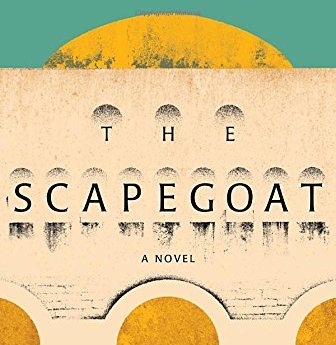It is always a good sign when a book makes you laugh on the first page. In the opening scene of Sophia Nikolaidou’s novel, The Scapegoat, an American reporter named Jack Talas observes a dirty and scabbed old villager, “A man who took life as it came and made the most of it—or so he seemed to the American, who’d been raised on eggs and bacon, had studied at expensive schools, had seen plenty of poor people in photographs. Now he wrote dispatches about them, and he did so with compassion.”
With compassion. This phrase evoked such a bombastic, self-assured character it made me laugh out loud. However, if you’re dead set on comedy, that’s too bad. Because by the next page, Jack Talas is a corpse, found floating in the Mediterranean with cuttlefish eggs in his eyelashes. The Scapegoat is based on the murder of CBS reporter George Polk, who, like his fictional double Talas, was in Greece in 1948 to expose the government’s corrupted use of American aid relief.
Talas makes enemies of everyone: the government, the communists, and even the Americans. But it is a fellow journalist, named Manolis Gris, who is accused of murdering Talas. However, the forces behind Gris’s indictment reach far beyond Gris himself.
When Jack Talas is killed, U.S. pressure on Greek authorities to find the culprit lands on the shoulders of one nose-picking, toe-breaking police chief, who creatively interprets the inherent rivalry between two countries—rich America and war-torn Greece—as a motive for the crime.
The crime is carried over into the present (2011), when a teenager named Minas is given an alternative research assignment: rake up the muck of a decades-old mystery. Minas’s mentor is the stony-faced, black-shrouded history teacher, Souk. The trope of the exceptional, if difficult, student’s relationship with a brilliant, ornery teacher manages to be exciting here, as it has been foreshadowed by another such relationship (Minolas Gris’s) a half-century earlier, which ended in disaster.
Indeed, in The Scapegoat, repetition of themes across decades, families, and countries is more than just a writing device; it’s the most captivating part of the novel. The similarities that pop up unexpectedly and yet completely naturally between seemingly disconnected characters reveal a web of journalists, teachers, and families, and we see just how interconnected the fates of individuals and nations really are.
Politics exist at all levels, from the international scale all the way down to a school faculty meeting or the family dinner table. Family politics (a son declares he won’t go to university, and “If I have to take another exam I’ll die!”) mirror in language and ferocity the issues of the nation, as the economic collapse threatens every aspect of these characters’ lives. Minas’s father is a newspaper editor, fearing immanent big budget cuts. His mother was a lit-major whose happiness rests on her son’s education. His grandmother is a former literature teacher, that Minas describes as being proud to read Plato in the original. Minas himself sees no point in education when a college graduate still faces an abysmal job market.
Even though the mystery is decades old by the time it reaches the main character, The Scapegoat is a page-turner. Its language is easy to read, which is perhaps how Nikolaidou pulls off jumping between first-person narrators and third-person accounts titled “From Other Eyes.” Even without the clarifying headers she employs, the voices are unique enough to distinguish, ranging from a torture-happy police chief, to the barely legal-aged Greek widow of the murdered journalist. Zoe, or Zazou as Talas called her, can’t yet dance jazz, but she talks like a Hollywood starlet, spouting phrases like, “With him the day was a thousand hours long.”
In fact, this book is chock-full of idioms, often piled on top of one another. In this passage Gris’s sister describes their mother: “She blew wind into our sails. She never touched our souls with dirty hands. She gloried in us from afar and prayed for the best. She believed we could take the moon down from the sky if we wanted. She didn’t care if no one else agreed.” These relatable colloquialisms and universal clichés are what make the confessional, first-person accounts entirely engrossing: the characters talk like real people.
If these sayings sound familiar to you as an English-language reader, it’s because some of them are. Translator Karen Emmerich used a mix of literally translated Greek expressions and analogous English expressions, with some idioms—like putting the wind in their sails—common to both languages. One instance of substitution is when the police chief remarks that a Greek reporter could “never have his moment in the sun” compared to Talas. The original Greek saying is to be “behind the sun,” or overshadowed.
The unfamiliar phrases are often ones that Emmerich translated word-for-word. Manolis’s mother, for instance, is a refugee from Pontus; her idioms are literally translated to maintain the foreignness that might otherwise be lost on a non-Greek reader. A striking passage in her voice is this one: “I never had a chance to kiss the blood of my son. They buried him in a foreign land and sent me a piece of paper. I thought I would die. My guts turned to rock. If you slit me open, you’d find soil and stone. Any mother would understand. And anyone else should keep quiet. May their mouths be filled with cement.”
The English-language reader won’t be at a loss for what a character means by an idiom, and character reactions are enough to understand the regional politics and history.
Although it contains elements of both, The Scapegoat isn’t so much of a who dunit mystery or a courtroom drama. I wouldn’t read it for its poetry, but it is exemplary storytelling. The multi-voiced, fractal unraveling of history comes across as an extremely naturalistic mode for comparing past and present; and here, with the voices speaking across a gap of 60-odd years, from post-war and post-economic-crises Greece, the comparisons are absolutely chilling.

